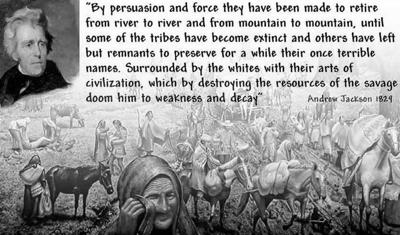You are using an out of date browser. It may not display this or other websites correctly.
You should upgrade or use an alternative browser.
You should upgrade or use an alternative browser.
The shameful history that no Democrat should defend
- Thread starter Diogenes
- Start date
AProudLefty
The remora of JPP
Nice trolling.
"That’s not just my goal. That’s what God wants! Most of our people don’t want it yet. You love your enemy. You want to stay with your enemy. You’re in love with his wealth! Oh, I understand the fascination, slaves! I understand that. But God has something else for us! Let me tell you what’s gonna happen. Yes, I’m after a separate state. A separate nation. In the ’60s, what was our cry, Rock? We weren’t saying we want to integrate, we were saying ‘It’s nation time!’ Black Power to do what? To integrate a lunch counter? Black Power to build a nation for 40 million — now near 50 million — Black people".

AProudLefty
The remora of JPP
Legion is on a roll with his trolling.
President Bush the Elder sent U.S. forces into Somalia in December 1992 to aid the United Nations in relieving a massive famine.
In May of 1993, four months into his term, President Clinton declared that mission accomplished and pulled out most of the U.S. forces.
In a speech on the South Lawn to associate himself with the effort, he extolled the decision to intervene: "If all of you who served had not gone, it is absolutely certain that tens of thousands would have died by now." It was a "successful mission," he said, and "proved yet again that American leadership can help to mobilize international action."
But back in Somalia, with no U.S. deterrent, Somalia's warlords began fighting again.
After a series of bloody attacks on U.N. peacekeepers, Clinton launched a new mission: In August 1993, he sent in a force of Rangers and Special Forces units to capture the brutal warlord Mohammad Farrah Aidid and restore order.
That force asked for heavy armor -- in the form of Abrams tanks and Bradley armored vehicles -- as well as the AC-130 gunship, but the Clinton Administration denied those requests.
On October 3 on a mission to pick up Aidid, two Black Hawks were unexpectedly shot down; in the ensuing urban gun battle, 18 American soldiers were killed and another 73 injured.
Clinton's responsibility in Somalia doesn't stop there. Despite the mistakes that October day, Aidid had been struck a blow.
The U.S. military, with 18 dead, wanted nothing more than to finish what it had started. Clinton instead aborted the mission.
The U.S. released the criminals it had captured that same day at such great cost, and the U.N., lacking U.S. support, was powerless to keep order.
Somalia remains a lawless, impoverished nation.
Worse, the terrorists of al Qaeda interpreted the U.S. retreat from Somalia as a sign of American weakness that may have convinced them we could be induced to retreat from the Middle East if they took their attacks to the U.S. homeland.
Those are the facts.
Clinton claimed later: "These people ran on responsibility, but as soon as you scratch them they go straight to blame. Now, you know, I didn't blame his [President Bush's] father for Somalia when we had that awful day memorialized in 'Black Hawk Down.' I didn't do that."
We can understand Clinton wanting to defend himself, but as usual he can't get his own facts straight. His introduction of Somalia here is one of those breathtakingly brazen attempts to dodge responsibility for which Mr. Clinton is justly famous.
The reason Clinton can't blame the events of "Black Hawk Down" on President Bush is because those events had nothing to do with him. They were Clinton's responsibility, and his alone.
Crepitus
Verified User
Why are you still so triggered?
You know you won the election, right?
AProudLefty
The remora of JPP
He's Legion.Why are you still so triggered?
You know you won the election, right?










